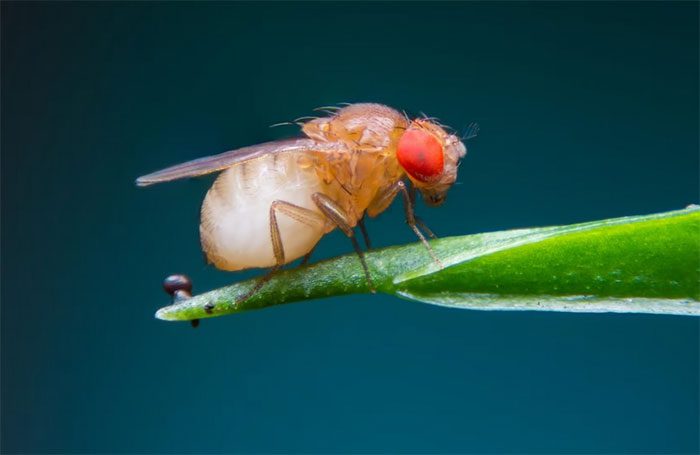Researchers indicate that not only humans consume alcoholic beverages, but even wild animals can become “tipsy” due to alcohol naturally found in fruits and fermented nectar.
Alcohol appears in nearly every ecosystem on Earth, leading many species that consume sweet fruits and nectar to regularly ingest this intoxicating substance.
Many species have evolved to withstand alcohol, while others have learned to use it as a self-defense mechanism. For instance, fruit flies often lay their eggs in ethanol-rich food, protecting them from parasites. However, some species seem unable to cope with the effects of alcohol found in nature.

A fruit fly. (Photo: Alamy).
After thoroughly examining research papers on animals and alcohol, a team of scientists at the University of Exeter (UK) discovered a “diverse group” of species that have consumed and adapted to ethanol from fermented fruits and nectar.
Ethanol has been prevalent on Earth for about 100 million years, since flowering plants began producing sweet fruits and yeasts caused nectar to ferment. This natural alcohol content is usually low, at around 1% to 2% alcohol by volume, but can reach up to 10% in overripe palm fruits.
In one study, there was photographic evidence of wild chimpanzees in southeastern Guinea intoxicated from drinking the sap of raffia palms. Meanwhile, spider monkeys on Barro Colorado Island in Panama preferred the golden mombin fruit, which contains between 1% and 2.5% alcohol.
Whether the consumption of alcohol by animals in the wild leads to intoxication is another matter. There are many stories of drunken animals, from elephants and vervet monkeys feasting on marula fruit in Botswana to a moose getting its head stuck in a tree in Sweden after munching on fermented apples… However, their blood alcohol concentrations were never measured.
Animals that frequently consume fermented food tend to metabolize alcohol quickly, avoiding its worst effects. But some species that do not regularly consume ethanol may face consequences.
Tests on Bombycilla cedrorum birds that died after colliding with fences and other structures revealed they had flown under the influence of alcohol after eating overripe fruit from the Brazil nut tree.
Earlier this month, researchers at Tel Aviv University (Israel) discovered that Eastern hornets may be the only known animal capable of consuming unlimited amounts of alcohol without adverse effects on behavior or causing death.


















































